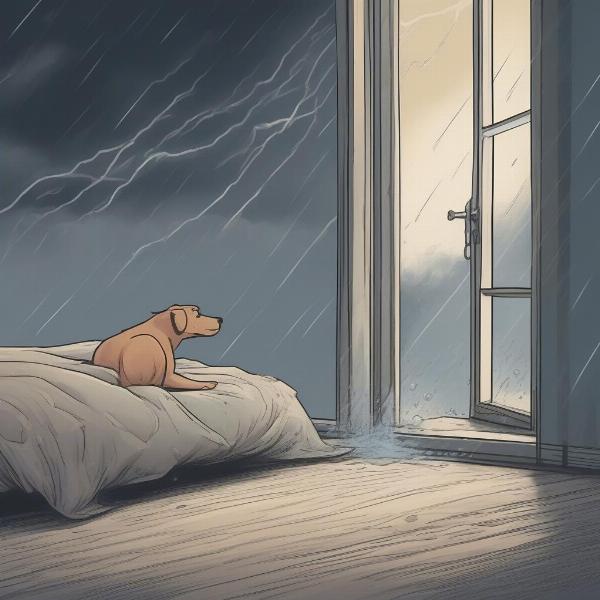Discovering your dog has urinated on your bed can be frustrating and upsetting. But before you get angry, it’s important to understand that there are several underlying reasons why your dog might exhibit this behavior. It’s rarely out of spite or revenge, but rather a sign of a physical or emotional issue that needs to be addressed. Let’s delve into the common causes of this frustrating problem and explore how to help your furry friend.
Medical Reasons for Canine Urination on Beds
Sometimes, medical issues are the culprit behind inappropriate urination. A urinary tract infection (UTI), bladder stones, kidney disease, diabetes, or even cognitive decline in older dogs can cause an increased urge to urinate and difficulty controlling the bladder. If your dog suddenly starts urinating in unusual places, a trip to the vet is crucial to rule out any underlying medical conditions.
Behavioral Reasons Why Dogs Pee on Beds
If your vet gives your dog a clean bill of health, the cause is likely behavioral. Several factors can contribute to this issue.
Anxiety and Stress
Dogs can express anxiety and stress in various ways, and inappropriate urination is one of them. Changes in routine, new people or pets in the household, loud noises, or even being left alone for long periods can trigger anxiety that manifests as bed-wetting.
Marking Territory
While less common with neutered and spayed dogs, some dogs might urinate on the bed to mark their territory, especially if there are other pets in the home. The bed, carrying your scent, is a prime target for this type of marking behavior.
Submission or Excitement
Submissive urination, often seen in puppies or shy dogs, can occur when they are greeted enthusiastically or feel intimidated. Similarly, some dogs might urinate out of excitement when they are overjoyed to see you.
Lack of Proper House Training
If your dog was never properly house-trained or experienced a lapse in training, they might not fully understand that urinating indoors is unacceptable. Consistent and positive reinforcement training is crucial to address this issue.
 Dog Urinating on Bed Due to Anxiety
Dog Urinating on Bed Due to Anxiety
How to Stop Your Dog from Urinating on the Bed
Once you’ve identified the potential cause, you can start implementing solutions.
Consult Your Veterinarian
If medical issues are suspected, follow your vet’s recommendations for treatment. This is the crucial first step.
Manage Anxiety and Stress
Create a calm and predictable environment for your dog. Provide plenty of positive reinforcement, consider using calming aids like pheromone diffusers, and consult a certified dog trainer or behaviorist for professional guidance. dog restless might provide helpful tips on managing dog anxiety.
Reinforce House Training
Take your dog outside frequently, especially after waking up and after meals. Reward them with praise and treats when they eliminate outdoors. If you catch them in the act of urinating on the bed, interrupt with a firm “no” and immediately take them outside.
Clean Thoroughly
Use an enzymatic cleaner specifically designed for pet stains and odors to eliminate any trace of urine from the bed. This will prevent your dog from being drawn back to the same spot. For tips on eliminating dog odors, check out how to get a dog smell out of a couch.
Limit Access
If possible, prevent your dog from accessing the bedroom until the issue is resolved. This can be achieved by closing the door or using baby gates.
Expert Insights
“Addressing inappropriate urination requires patience and understanding,” says Dr. Emily Carter, a veterinary behaviorist. “It’s crucial to avoid punishment, which can worsen the problem. Instead, focus on positive reinforcement and addressing any underlying anxieties.”
Jane Douglas, a certified dog trainer, adds, “Establishing a consistent routine and providing plenty of mental and physical stimulation can significantly reduce anxiety-related urination.”
Conclusion
Understanding why your dog wees on your bed is the first step towards resolving the issue. By addressing the underlying cause, whether medical or behavioral, and implementing consistent training and management strategies, you can help your furry friend develop better habits and enjoy a clean and comfortable home. Remember, patience and positive reinforcement are key!
FAQ
- Why does my older dog suddenly started peeing on the bed? This could be due to age-related cognitive decline or medical conditions like incontinence. Consult your vet for a proper diagnosis.
- My dog only pees on my bed when I’m not home. What should I do? This suggests separation anxiety. Try creating a safe space for your dog and gradually increasing the time you leave them alone.
- Is it okay to scold my dog for peeing on the bed? No, scolding can worsen anxiety and make the problem worse. Focus on positive reinforcement instead.
- What’s the best way to clean dog urine from my bed? Use an enzymatic cleaner specifically designed for pet stains to eliminate the odor completely.
- How can I tell if my dog’s bed-wetting is medical or behavioral? A vet check-up is the best way to rule out medical causes.
- My dog pees on the bed when he’s excited. What can I do? Try to keep greetings calm and low-key. Redirect his excitement to a more appropriate activity, such as playing fetch.
- My dog is house-trained but started peeing on the bed after we got a new puppy. Why? This could be territorial marking or stress related to the change in the household dynamic. bingo dog may offer advice on introducing new pets.
Related Articles
About ILM Dog
ILM Dog is your trusted resource for comprehensive information on dog care and well-being. We offer expert advice on everything from breed selection and health care to training, nutrition, grooming, and product recommendations. Whether you’re a seasoned dog owner or just starting your journey with a furry friend, ILM Dog provides valuable insights to help you provide the best possible care for your canine companion. For personalized advice or to learn more about our services, contact us at [email protected] or call +44 20-3965-8624.